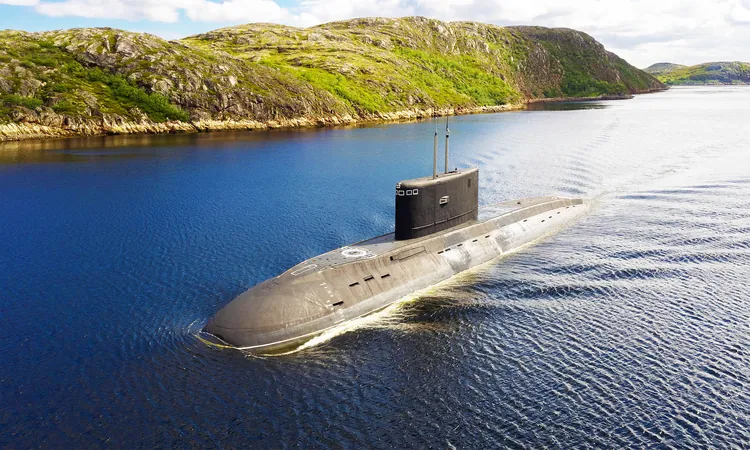
How Living in Submarines is Paving the Way for Future Astronauts
2024-12-19
Author: Wei Ling
The SubSea Initiative: A Deep Dive into Isolation
Recently, a select group of volunteers emerged from an intense two-month underwater stint known as the SubSea initiative. This unique project provided scientists from Germany, Italy, and Portugal with a window into the lived experiences of these submariners—where space is tight, privacy is nearly nonexistent, and daily routines are drastically altered.
Understanding how these individuals navigated life beneath the waves offers vital insights into what future astronauts may face on long-term missions, where communication with Earth can be scarce and the psychological toll can be heavy.
Gathering Data: More Than Just Surveys
During their underwater sojourn, participants completed detailed questionnaires to gauge their stress levels and mood changes, alongside scientists collecting hair and saliva samples to analyze hormonal shifts such as the stress hormone cortisol. Tracking immune responses within these confined quarters was crucial; the data gathered is transforming how we view stress management in both submarines and spacecraft.
Drawing Parallels: Astronauts and Submariners
While astronauts grapple with challenges like microgravity and equipment malfunctions, submarine crews contend with water pressure, humidity, and the constant drone of machinery. Both environments test human resilience and adaptability, making their parallels undeniable.
Experts from the Portuguese Navy, in collaboration with the Portuguese Space Agency, are harnessing their extensive maritime experience to enhance the knowledge base that will aid space travel. The cutting-edge research reflects a growing international commitment to understanding how extreme environments impact the human condition.
A Space Pioneer’s Perspective
Andreas Mogensen, a former Danish astronaut and part of the SubSea initiative, emphasized the significance of research focused on human resilience in extreme conditions. With his extensive experience—including a five-month tenure as an ISS commander—Mogensen highlighted the pressing need to understand how people adapt under isolation.
“Whether it’s under the sea, in space, or in remote locations, this research provides invaluable insights into human adaptability,” he explained.
Preparing for the Cosmic Frontier
The potential outcomes of connecting the experiences of submariners and space explorers could be groundbreaking. Daniel Neuenschwander of the European Space Agency remarked, “Understanding extreme environments will be essential in gearing up for future missions to the Moon, Mars, and beyond.”
That’s not all—Portugal is actively preparing for a significant role in space exploration. Through initiatives like the Portugal Space 2030 Strategy, the nation aims to build a robust space sector that not only focuses on satellite technology but also on creating analog sites for research that simulate lunar and Martian conditions.
Beyond Space Exploration
Interestingly, the complexities learned from submarine life may well transcend space science. The routines that uplift spirits in confined naval vessels could also apply to remote work environments or medical facilities in isolated regions.
In many sectors—from polarized research stations to under-resourced communities—effective stress management and maintaining team morale are crucial, proving that the relevance of our findings goes well beyond just preparing astronauts for space travel.
The Road Ahead
As Portugal continues to cultivate its space ambitions, the intersections between underwater research and extraterrestrial exploration become clearer. Future astronaut training programs will undoubtedly benefit from every scrap of data collected from these submarine missions—offering lessons about scheduling meals, task-sharing, and even privacy management.
Ultimately, as we stand on the brink of interplanetary exploration, insights drawn from underwater experiences are shaping the future of human space travel, ensuring that we are well-prepared for the challenges that lie ahead.
This journey could represent not just a leap into the cosmos, but a profound understanding of what it means to be human in the depths of both the ocean and the universe beyond.
Stay tuned for more groundbreaking explorations into the ties between Earth and space as we prepare to unlock the mysteries of the universe!




 Brasil (PT)
Brasil (PT)
 Canada (EN)
Canada (EN)
 Chile (ES)
Chile (ES)
 España (ES)
España (ES)
 France (FR)
France (FR)
 Hong Kong (EN)
Hong Kong (EN)
 Italia (IT)
Italia (IT)
 日本 (JA)
日本 (JA)
 Magyarország (HU)
Magyarország (HU)
 Norge (NO)
Norge (NO)
 Polska (PL)
Polska (PL)
 Schweiz (DE)
Schweiz (DE)
 Singapore (EN)
Singapore (EN)
 Sverige (SV)
Sverige (SV)
 Suomi (FI)
Suomi (FI)
 Türkiye (TR)
Türkiye (TR)